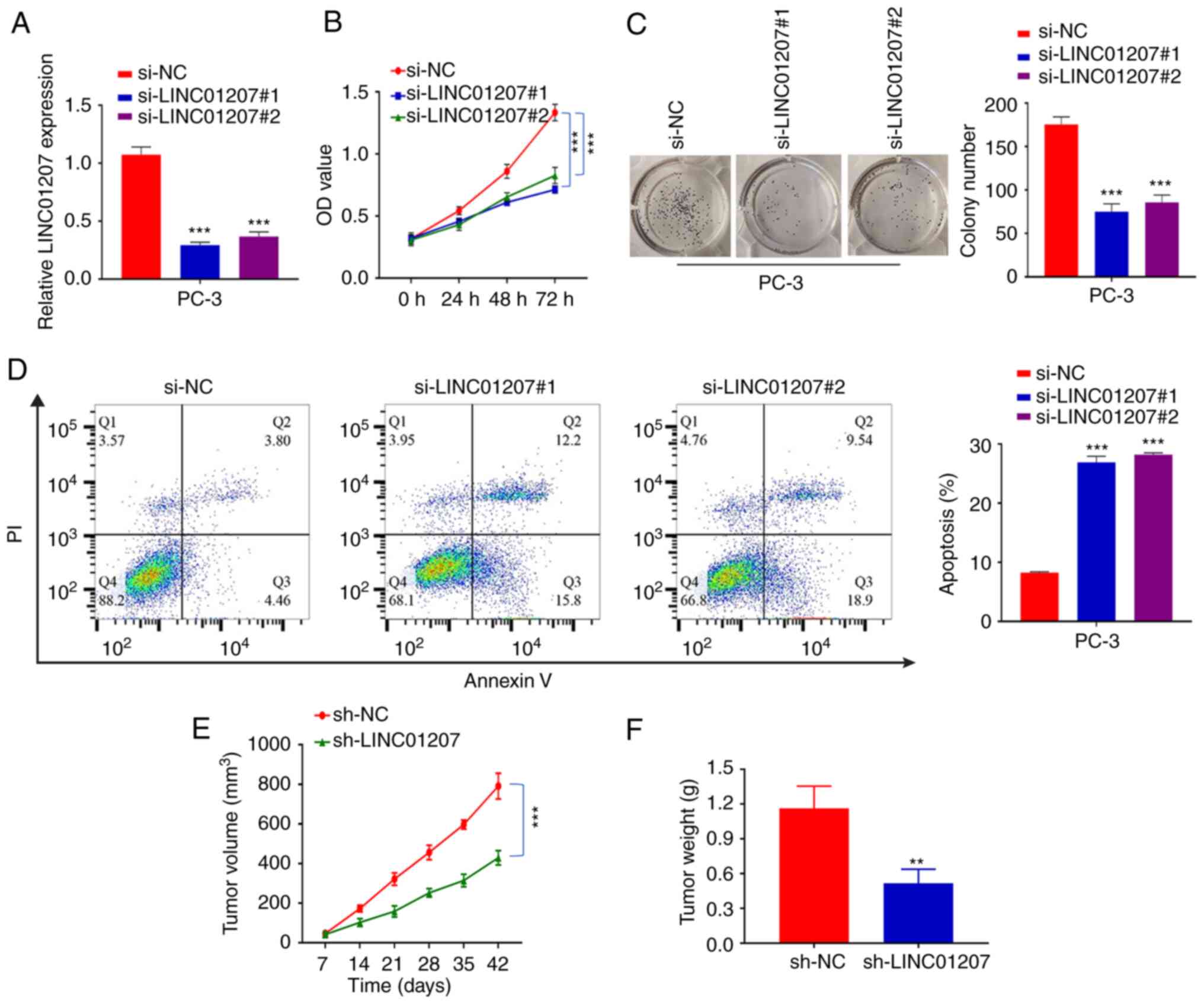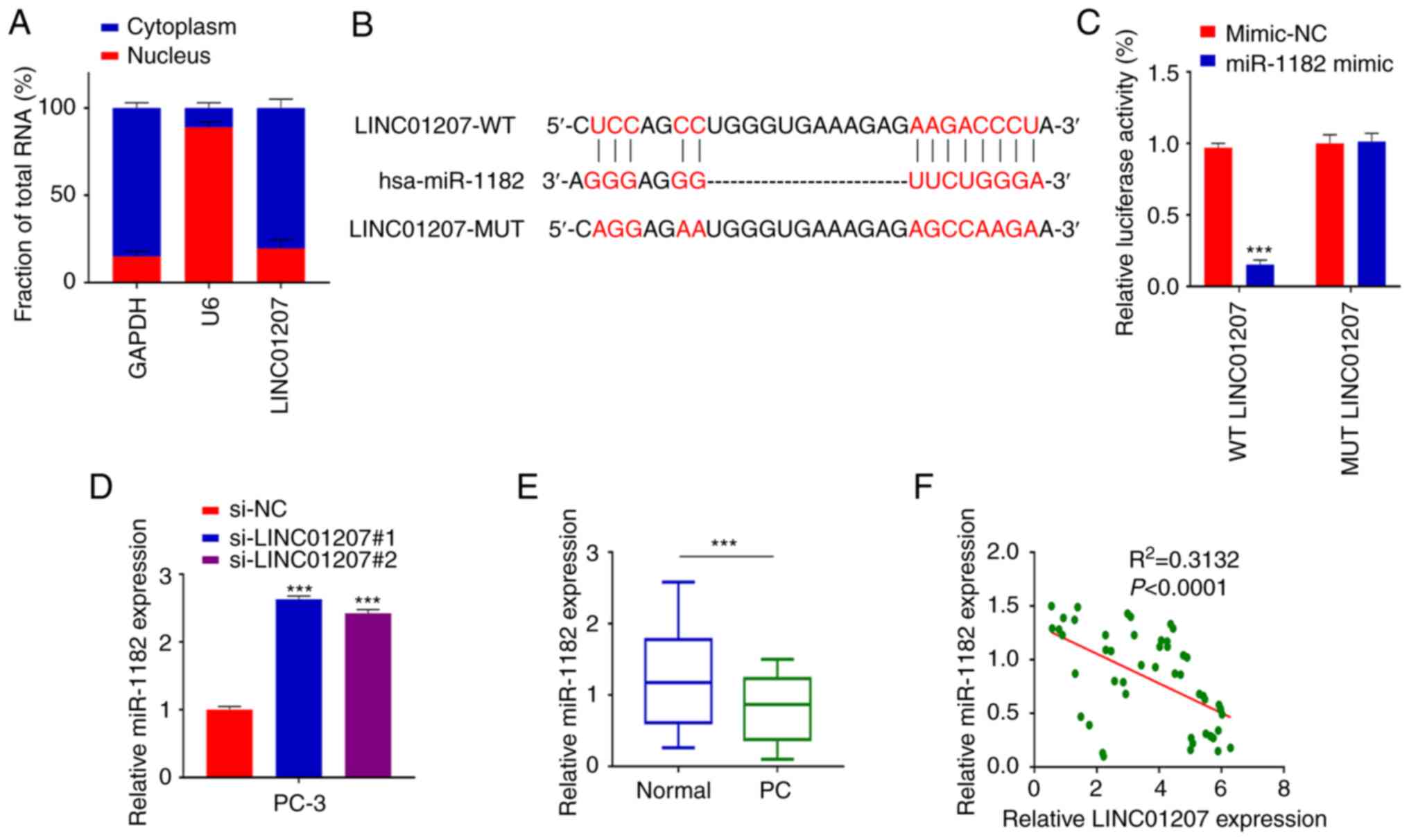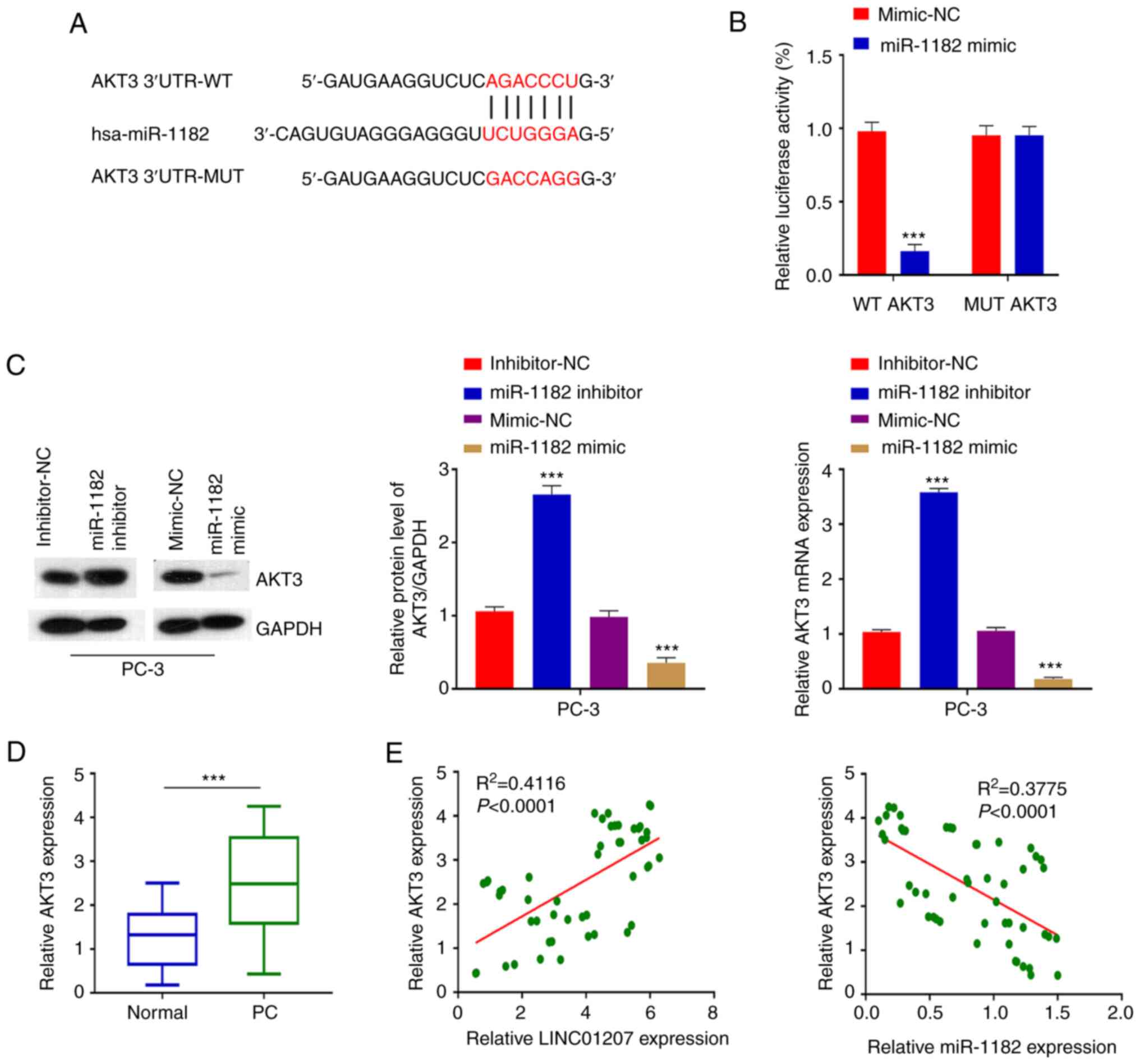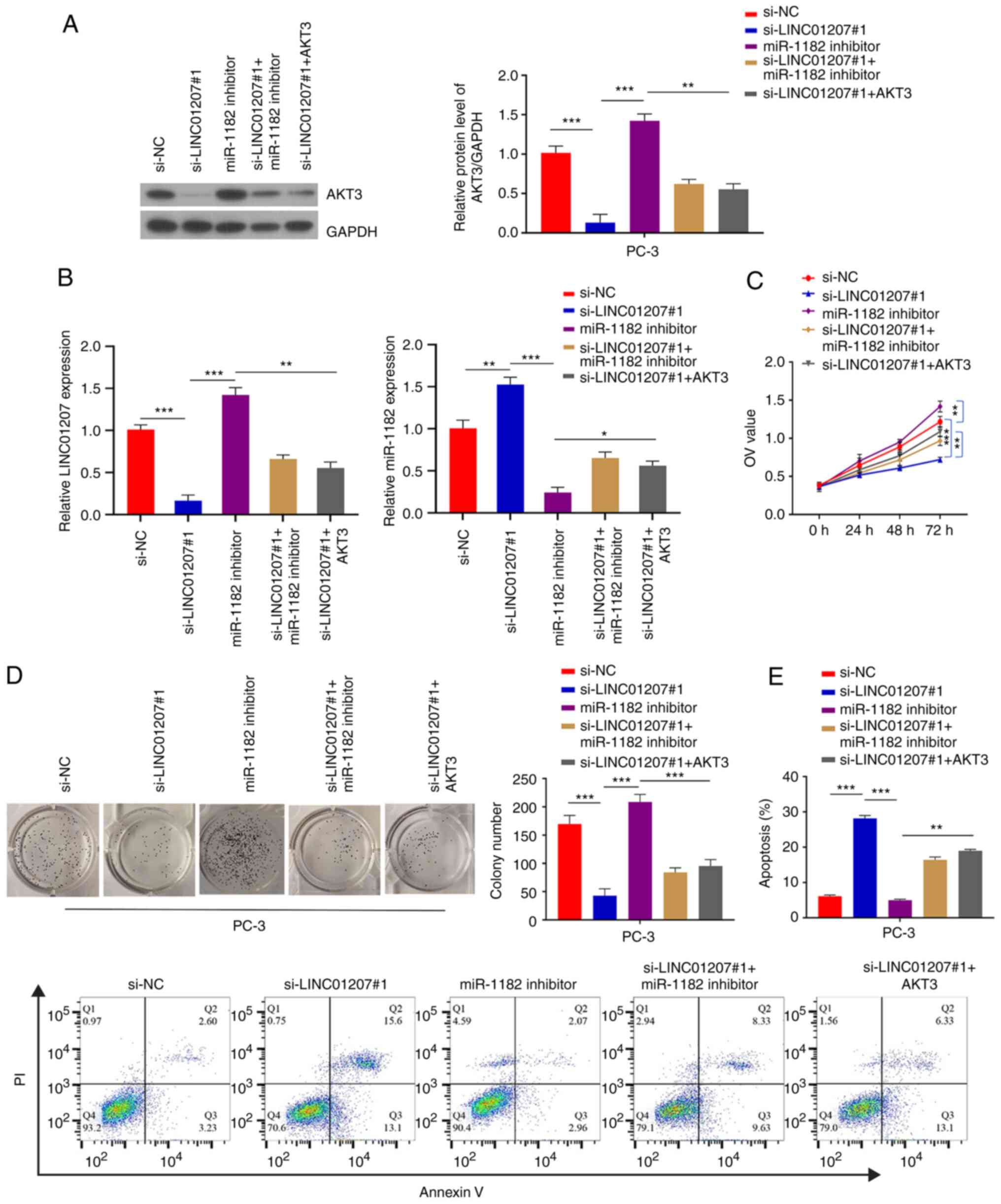|
1
|
Edwards DR, Moroz K, Zhang H, Mulholland
D, Abdel-Mageed AB and Mondal D: PRL-3 increases the aggressive
phenotype of prostate cancer cells in vitro and its expression
correlates with high-grade prostate tumors in patients. Int J
Oncol. 52:402–412. 2018.PubMed/NCBI
|
|
2
|
Shukla ME, Yu C, Reddy CA, Stephans KL,
Klein EA, Abdel-Wahab M, Ciezki J and Tendulkar RD: Evaluation of
the current prostate cancer staging system based on cancer-specific
mortality in the surveillance, epidemiology, and end results
database. Clin Genitourin Cancer. 13:17–21. 2015. View Article : Google Scholar : PubMed/NCBI
|
|
3
|
Miyake H and Fujisawa M: Prognostic
prediction following radical prostatectomy for prostate cancer
using conventional as well as molecular biological approaches. Int
J Urol. 20:301–311. 2013. View Article : Google Scholar : PubMed/NCBI
|
|
4
|
Heidenreich A, Bellmunt J, Bolla M, Joniau
S, Mason M, Matveev V, Mottet N, Schmid HP, van der Kwast T, Wiegel
T, et al: EAU guidelines on prostate cancer. Part 1: Screening,
diagnosis, and treatment of clinically localised disease. Eur Urol.
59:61–71. 2011. View Article : Google Scholar : PubMed/NCBI
|
|
5
|
Dall'Era MA, Albertsen PC, Bangma C,
Carroll PR, Carter HB, Cooperberg MR, Freedland SJ, Klotz LH,
Parker C and Soloway MS: Active surveillance for prostate cancer: A
systematic review of the literature. Eur Urol. 62:976–983. 2012.
View Article : Google Scholar : PubMed/NCBI
|
|
6
|
Egidi MG, Cochetti G, Guelfi G, Zampini D,
Diverio S, Poli G and Mearini E: Stability assessment of candidate
reference genes in urine sediment of prostate cancer patients for
miRNA applications. Dis Markers. 2015:9735972015. View Article : Google Scholar : PubMed/NCBI
|
|
7
|
Cochetti G, Poli G, Guelfi G, Boni A,
Egidi MG and Mearini E: Different levels of serum microRNAs in
prostate cancer and benign prostatic hyperplasia: Evaluation of
potential diagnostic and prognostic role. Onco Targets Ther.
9:7545–7553. 2016. View Article : Google Scholar : PubMed/NCBI
|
|
8
|
Bartel DP: MicroRNAs: Genomics,
biogenesis, mechanism, and function. Cell. 116:281–297. 2004.
View Article : Google Scholar : PubMed/NCBI
|
|
9
|
Calin GA and Croce CM: MicroRNA signatures
in human cancers. Nat Rev Cancer. 6:857–866. 2006. View Article : Google Scholar : PubMed/NCBI
|
|
10
|
Gao Q and Zheng J: microRNA-323
upregulation promotes prostate cancer growth and docetaxel
resistance by repressing p73. Biomed Pharmacother. 97:528–534.
2018. View Article : Google Scholar : PubMed/NCBI
|
|
11
|
Kanwal R, Plaga AR, Liu X, Shukla GC and
Gupta S: MicroRNAs in prostate cancer: Functional role as
biomarkers. Cancer Lett. 407:9–20. 2017. View Article : Google Scholar : PubMed/NCBI
|
|
12
|
Cochetti G, Rossi de Vermandois JA, Maulà
V, Giulietti M, Cecati M, Del Zingaro M, Cagnani R, Suvieri C,
Paladini A and Mearini E: Role of miRNAs in prostate cancer: Do we
really know everything? Urol Oncol. 38:623–635. 2020. View Article : Google Scholar : PubMed/NCBI
|
|
13
|
Guelfi G, Cochetti G, Stefanetti V,
Zampini D, Diverio S, Boni A and Mearini E: Next generation
Sequencing of urine exfoliated cells: An approach of prostate
cancer microRNAs research. Sci Rep. 8:71112018. View Article : Google Scholar : PubMed/NCBI
|
|
14
|
Situ J, Zhang H, Jin Z, Li K, Mao Y and
Huang W: MicroRNA-939 directly targets HDGF to inhibit the
aggressiveness of prostate cancer via deactivation of the
WNT/β-catenin pathway. Onco Targets Ther. 13:4257–4270. 2020.
View Article : Google Scholar : PubMed/NCBI
|
|
15
|
Yu C, Wang Y, Liu T, Sha K, Song Z, Zhao M
and Wang X: The microRNA miR-3174 suppresses the expression of
ADAM15 and inhibits the proliferation of patient-derived bladder
cancer cells. Onco Targets Ther. 13:4157–4168. 2020. View Article : Google Scholar : PubMed/NCBI
|
|
16
|
Zhou J, Dai W and Song J: miR-1182
inhibits growth and mediates the chemosensitivity of bladder cancer
by targeting hTERT. Biochem Biophys Res Commun. 470:445–452. 2016.
View Article : Google Scholar : PubMed/NCBI
|
|
17
|
Hou XS, Han CQ and Zhang W: MiR-1182
inhibited metastasis and proliferation of ovarian cancer by
targeting hTERT. Eur Rev Med Pharmacol Sci. 22:1622–1628.
2018.PubMed/NCBI
|
|
18
|
Zhang D, Xiao YF, Zhang JW, Xie R, Hu CJ,
Tang B, Wang SM, Wu YY, Hao NB and Yang SM: miR-1182 attenuates
gastric cancer proliferation and metastasis by targeting the open
reading frame of hTERT. Cancer Lett. 360:151–159. 2015. View Article : Google Scholar : PubMed/NCBI
|
|
19
|
Huang C, Deng H, Wang Y, Jiang H, Xu R,
Zhu X, Huang Z and Zhao X: Circular RNA circABCC4 as the ceRNA of
miR-1182 facilitates prostate cancer progression by promoting FOXP4
expression. J Cell Mol Med. 23:6112–6119. 2019. View Article : Google Scholar : PubMed/NCBI
|
|
20
|
Dillon RL, White DE and Muller WJ: The
phosphatidyl inositol 3-kinase signaling network: Implications for
human breast cancer. Oncogene. 26:1338–1345. 2007. View Article : Google Scholar : PubMed/NCBI
|
|
21
|
Liby TA, Spyropoulos P, Buff Lindner H,
Eldridge J, Beeson C, Hsu T and Muise-Helmericks RC: Akt3 controls
vascular endothelial growth factor secretion and angiogenesis in
ovarian cancer cells. Int J Cancer. 130:532–543. 2012. View Article : Google Scholar : PubMed/NCBI
|
|
22
|
Nakatani K, Thompson DA, Barthel A, Sakaue
H, Liu W, Weigel RJ and Roth RA: Up-regulation of Akt3 in estrogen
receptor-deficient breast cancers and androgen-independent prostate
cancer lines. J Biol Chem. 274:21528–21532. 1999. View Article : Google Scholar : PubMed/NCBI
|
|
23
|
Lin HP, Lin CY, Huo C, Jan YJ, Tseng JC,
Jiang SS, Kuo YY, Chen SC, Wang CT, Chan TM, et al: AKT3 promotes
prostate cancer proliferation cells through regulation of Akt,
B-Raf, and TSC1/TSC2. Oncotarget. 6:27097–27112. 2015. View Article : Google Scholar : PubMed/NCBI
|
|
24
|
Zhang F and Wu Z: Significantly altered
expression of miR-511-3p and its target AKT3 has negative
prognostic value in human prostate cancer. Biochimie. 140:66–72.
2017. View Article : Google Scholar : PubMed/NCBI
|
|
25
|
Lin HP, Jiang SS and Chuu CP: Caffeic acid
phenethyl ester causes p21 induction, Akt signaling reduction, and
growth inhibition in PC-3 human prostate cancer cells. PLoS One.
7:e312862012. View Article : Google Scholar : PubMed/NCBI
|
|
26
|
Wang G, Chen H and Liu J: The long
noncoding RNA LINC01207 promotes proliferation of lung
adenocarcinoma. Am J Cancer Res. 5:3162–3173. 2015.PubMed/NCBI
|
|
27
|
Wang M, Lu X, Dong X, Hao F, Liu Z, Ni G
and Chen D: pERK1/2 silencing sensitizes pancreatic cancer BXPC-3
cell to gemcitabine-induced apoptosis via regulating Bax and Bcl-2
expression. World J Surg Oncol. 13:662015. View Article : Google Scholar : PubMed/NCBI
|
|
28
|
Wang Y, Li Z, Zheng S, Zhou Y, Zhao L, Ye
H, Zhao X, Gao W, Fu Z, Zhou Q, et al: Expression profile of long
non-coding RNAs in pancreatic cancer and their clinical
significance as biomarkers. Oncotarget. 6:35684–35698. 2015.
View Article : Google Scholar : PubMed/NCBI
|
|
29
|
Liu C, Wang JO, Zhou WY, Chang XY, Zhang
MM, Zhang Y and Yang XH: Long non-coding RNA LINC01207 silencing
suppresses AGR2 expression to facilitate autophagy and apoptosis of
pancreatic cancer cells by sponging miR-143-5p. Mol Cell
Endocrinol. 493:1104242019. View Article : Google Scholar : PubMed/NCBI
|
|
30
|
Livak KJ and Schmittgen TD: Analysis of
relative gene expression data using real-time quantitative PCR and
the 2(−Delta Delta C(T)) method. Methods. 25:402–408. 2002.
View Article : Google Scholar : PubMed/NCBI
|
|
31
|
National Research Council (US) Committee
for the Update of the Guide for the Care, Use of Laboratory
Animals: Guide for the Care and Use of Laboratory Animals. (8th
edition). https://grants.nih.gov/grants/olaw/guide-for-the-care-and-use-of-laboratory-animals.pdfOctober
21–2021
|
|
32
|
Deng T, Yuan Y, Zhang C, Zhang C, Yao W,
Wang C, Liu R and Ba Y: Identification of circulating miR-25 as a
potential biomarker for pancreatic cancer diagnosis. Cell Physiol
Biochem. 39:1716–1722. 2016. View Article : Google Scholar : PubMed/NCBI
|
|
33
|
Cai B, Song XQ, Cai JP and Zhang S:
HOTAIR: A cancer-related long non-coding RNA. Neoplasma.
61:379–391. 2014. View Article : Google Scholar : PubMed/NCBI
|
|
34
|
Pang EJ, Yang R, Fu XB and Liu YF:
Overexpression of long non-coding RNA MALAT1 is correlated with
clinical progression and unfavorable prognosis in pancreatic
cancer. Tumor Biol. 36:2403–2407. 2015. View Article : Google Scholar : PubMed/NCBI
|
|
35
|
Wang S, Qiu J, Wang L, Wu Z, Zhang X, Li Q
and Jiang F: Long non-coding RNA LINC01207 promotes prostate cancer
progression by downregulating microRNA-1972 and upregulating LIM
and SH3 protein 1. IUBMB Life. 72:1960–1975. 2020. View Article : Google Scholar : PubMed/NCBI
|



















